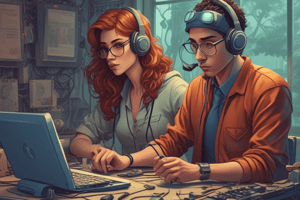Podcast
Questions and Answers
What is a common cause of a computer freezing?
What is a common cause of a computer freezing?
- Computer overheating due to fan not working (correct)
- Outdated software
- Operating system update problem
- Slow internet
What is a potential indication of a failing hard drive?
What is a potential indication of a failing hard drive?
- Noisy hard drive (correct)
- BSOD
- Printer not working
- Slow internet
What could be a cause of a computer becoming slow?
What could be a cause of a computer becoming slow?
- Outdated operating system
- Printer not working
- Malfunctioning computer fan
- Insufficient RAM (correct)
What is a common consequence of a system automatically restarting?
What is a common consequence of a system automatically restarting?
What could be a cause of a printer not working?
What could be a cause of a printer not working?
Study Notes
Common Computer Problems and Solutions
Computer Will Not Turn On
- No power: Check the power cord, plug, and socket for damages or loose connections.
- Faulty power supply: Replace the power supply unit if it's not functioning properly.
- Dead motherboard: If the motherboard is damaged, it may prevent the computer from turning on.
Slow Internet
- Outdated router firmware: Regularly update the router's firmware to ensure optimal performance.
- Overloaded network: Limit the number of devices connected to the network to improve speed.
- Physical obstructions: Move obstructions, such as walls or furniture, that may be interfering with the Wi-Fi signal.
PC Becoming Slow
- Insufficient RAM: Upgrade the RAM to ensure the computer can handle multiple tasks efficiently.
- Disk space: Free up disk space by deleting unnecessary files and programs.
- Outdated software: Regularly update software to prevent performance issues.
Operating System Update Problem
- Incompatible software: Check for incompatible software that may be causing the update issue.
- Corrupted system files: Run a system file checker to identify and repair corrupted files.
- Insufficient storage space: Ensure sufficient storage space is available for the update.
Noisy Hard Drive
- Bad sectors: Run a disk check to identify and repair bad sectors.
- Loose connections: Check the hard drive connections for any loose or damaged cables.
- Overheating: Ensure proper cooling and ventilation to prevent overheating.
Computer Fan Not Working
- Clogged air vents: Clean dust and debris from the air vents to ensure proper airflow.
- Faulty fan: Replace the fan if it's not functioning properly.
- Overheating: Monitor the computer's temperature to prevent overheating.
Printer Not Working
- Outdated printer drivers: Regularly update printer drivers to ensure compatibility.
- Paper jam: Check for and resolve any paper jams or obstructions.
- Clogged printhead: Clean the printhead to ensure proper ink flow.
Blue Screen of Death (BSOD)
- Overheating: Monitor the computer's temperature to prevent overheating.
- Driver issues: Update drivers to prevent conflicts and crashes.
- Faulty hardware: Identify and replace any faulty hardware components.
Computer Freezes
- Overheating: Monitor the computer's temperature to prevent overheating.
- Insufficient RAM: Upgrade the RAM to ensure the computer can handle multiple tasks efficiently.
- Malware: Run regular virus scans to prevent malware infections.
System Automatically Restarts
- Overheating: Monitor the computer's temperature to prevent overheating.
- Driver issues: Update drivers to prevent conflicts and crashes.
- Faulty BIOS: Update the BIOS to ensure compatibility and stability.
Studying That Suits You
Use AI to generate personalized quizzes and flashcards to suit your learning preferences.
Description
Test your knowledge of troubleshooting common computer issues with this quiz. Identify the causes and solutions for problems like computer not turning on, slow internet, PC becoming slow, operating system update issues, noisy hard drive, computer fan malfunction, printer not working, Blue Screen Of Death (BSOD), computer freezing, and automatic system restarts.




